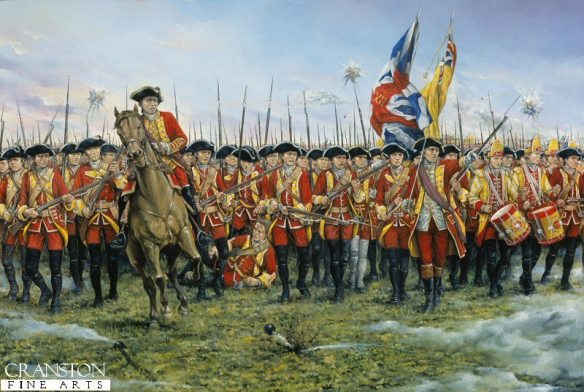
The 12th (Suffolk Regiment) at the Battle of Minden. 1st August 1759 by Brian Palmer.
The Battle of Minden, 1st August 1759 by David Rowlands.
The British army during the Seven Years’ War is usually discussed in terms of James Wolfe and the capture of Québec in 1759. The campaigns in Europe are also worthy of note. They indicate the multiple capability of the British army, a capability that was certainly far greater than its Prussian ally, for the latter did not have to mount amphibious operations nor operate in Portugal, an area where the British had to face logistical problems, the difficulties of campaigning in an unfamiliar land and the problems of cooperating with allies.
The British army was in part to be divided in subsequent decades between “Germans” and “Americans”: officers who had predominantly served in one or another sphere during the Seven Years’ War. There was less difference between their experiences than is sometimes imagined, not least because “woodcraft” and dispersed tactics were less important in North America and less absent in Germany than is sometimes appreciated. Furthermore, the notion of Continental warfare as hidebound, rigid and limited can be challenged.
During the 1740s and 1750s there were some reforms in the way in which the army operated, although less so than in the case of the Austrian and Russian armies in the 1750s. After the War of the Austrian Succession, Cumberland sought to improve the army’s effectiveness and, already, in 1744, a visit by the Duke to the Academy at Woolwich had led to measures being adopted to reform the discipline and system of training of the cadets. More generally, Cumberland pressed the importance of merit in promotions, and sought to create an effective fighting force. The Duke stressed the responsibilities of commanders. However, Cumberland’s controversial political position, alleged political ambitions and reputation as a martinet limited his influence.
In terms of weaponry the British army was in an acceptable position, and its infantry and artillery firepower both proved more than satisfactory at Minden. If the army is not noted for tactical innovation, as was the army of Frederick the Great, it was, nevertheless, the case that the British faced a number of different battlefield scenarios and were able to cope with them. Strategy owed much to political pressures and the exigencies of alliance politics, as with coastal expeditions and campaigning in Germany, respectively. Yet it proved easier to combine effectively in the Anglo-German army under Ferdinand of Brunswick than in the Allied armies in the Low Countries in the 1740s.
Potentially most serious, was the absence of a united military command structure that would be able to devise and sustain coherent peacetime programmes of planning and improvement. This reflected the anti-military ethos of British politics, specific suspicions of Cumberland, the difficulties of enforcing discipline and diligence on aristocratic officers who owned their positions, and the more general absence of a bureaucratic ethos. As a consequence, the ability of the army to respond in a united and planned fashion to new developments was limited, and it had only limited success in improving its capability during the years of peace. This exacerbated the problems created by the small size of the peacetime army and, therefore, the need to expand it rapidly at the outset of each war.
However, such an expansion had been successfully undertaken during the Seven Years’ War and the army had gained in effectiveness with experience. It had not had to undergo the heavy casualties of the 1st Duke of Marlborough’s battlefields, and had not, therefore, lost a high percentage of its trained officers and men. The absence of any need to operate in the Low Countries close to French bases helped to protect the army from the pressures faced by that of Prussia, but fighting quality was also important. Thanks to the British infantry at Minden, the French in 1759 were not able to repeat their success of two years earlier in overrunning north-west Germany.